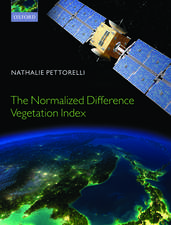Phenology: An Integrative Environmental Science
Editat de Mark D. Schwartzen Limba Engleză Paperback – 9 aug 2015
Assessing our changing world is a complex task that requires close cooperation from experts in biology, climatology, ecology, geography, oceanography, remote sensing, and other areas. Like its predecessor, this second edition of Phenology is a synthesis of current phenological knowledge, designed as a primer on the field for global change and general scientists, students, and interested members of the public. With updated and new contributions from over fifty phenological experts, covering data collection, current research, methods, and applications, it demonstrates the accomplishments, progress over the last decade, and future potential of phenology as an integrative environmental science.
| Toate formatele și edițiile | Preț | Express |
|---|---|---|
| Paperback (1) | 1232.57 lei 6-8 săpt. | |
| SPRINGER NETHERLANDS – 9 aug 2015 | 1232.57 lei 6-8 săpt. | |
| Hardback (1) | 1249.63 lei 3-5 săpt. | |
| SPRINGER NETHERLANDS – 12 aug 2013 | 1249.63 lei 3-5 săpt. |
Preț: 1232.57 lei
Preț vechi: 1503.14 lei
-18% Nou
Puncte Express: 1849
Preț estimativ în valută:
235.85€ • 256.100$ • 198.74£
235.85€ • 256.100$ • 198.74£
Carte tipărită la comandă
Livrare economică 23 aprilie-07 mai
Preluare comenzi: 021 569.72.76
Specificații
ISBN-13: 9789401781534
ISBN-10: 9401781532
Pagini: 632
Ilustrații: XX, 610 p. 130 illus., 61 illus. in color.
Dimensiuni: 155 x 235 x 33 mm
Greutate: 0.87 kg
Ediția:Softcover reprint of the original 2nd ed. 2013
Editura: SPRINGER NETHERLANDS
Colecția Springer
Locul publicării:Dordrecht, Netherlands
ISBN-10: 9401781532
Pagini: 632
Ilustrații: XX, 610 p. 130 illus., 61 illus. in color.
Dimensiuni: 155 x 235 x 33 mm
Greutate: 0.87 kg
Ediția:Softcover reprint of the original 2nd ed. 2013
Editura: SPRINGER NETHERLANDS
Colecția Springer
Locul publicării:Dordrecht, Netherlands
Cuprins
1. Introduction.- 2. East Asia.- 3. Australia and New Zealand.- 4. Europe.- 5. North America.- 6. A Review of Plant Phenology in South and Central America.- 7. Antarctica.- 8. International Phenological Observation Networks: Concept of IPG and GPM.- 9.Tropical Dry Climates.- 10. Mediterranean Phenology.- 11. Phenologies of North American Grasslands and Grasses.- 12. Mesic Temperate Deciduous Forest Phenology.- 13. Phenology at High Latitudes.- 14. Phenology at High Altitudes.- 15. Plant Development Models.- 16. Animal Life Cycle Models (Poikilotherms).- 17. Daily Temperature-based Temporal and Spatial Modeling of Tree Phenology.- 18. Plant Phenological “Fingerprints”.- 19. High-Resolution Phenological Data.- 20. Weather Station Siting: Effects on Phenological Models.- 21. Remote Sensing of Land Surface Phenology: A Prospectus.- 22. Near-Surface Sensor-Derived Phenology.- 23. Aquatic Plants and Animals.- 24. Birds.- 25. Reproductive Phenology of Large Mammals.- 26. Vegetation Phenology in Global Change Studies.- 27. Temperature Sensitivity of Canopy Photosynthesis Phenology in Northern Ecosystems.- 28. Phenology and Evapotranspiration.- 29. Phenology in Agriculture and Horticulture.- 30. Winegrape Phenology.- 31. Phenology in Higher Education: Ground-Based and Spatial Analysis Tools.
Textul de pe ultima copertă
Phenology refers to recurring plant and animal life cycle stages, such as leafing and flowering, maturation of agricultural plants, emergence of insects, and migration of birds. It is also the study of these recurring events, especially their timing and relationships with weather and climate. Phenological phenomena all give a ready measure of the environment as viewed by the associated organism, and are thus ideal indicators of the impact of local and global changes in weather and climate on the earth’s biosphere.
Assessing our changing world is a complex task that requires close cooperation from experts in biology, climatology, ecology, geography, oceanography, remote sensing, and other areas. Like its predecessor, this second edition of Phenology is a synthesis of current phenological knowledge, designed as a primer on the field for global change and general scientists, students, and interested members of the public. With updated and new contributions from over fifty phenological experts, covering data collection, current research, methods, and applications, it demonstrates the accomplishments, progress over the last decade, and future potential of phenology as an integrative environmental science.
Assessing our changing world is a complex task that requires close cooperation from experts in biology, climatology, ecology, geography, oceanography, remote sensing, and other areas. Like its predecessor, this second edition of Phenology is a synthesis of current phenological knowledge, designed as a primer on the field for global change and general scientists, students, and interested members of the public. With updated and new contributions from over fifty phenological experts, covering data collection, current research, methods, and applications, it demonstrates the accomplishments, progress over the last decade, and future potential of phenology as an integrative environmental science.
Caracteristici
Comprehensive topics, designed to nurture and serve the dynamic international and interdisciplinary phenological research community The Editor is co-founder of the USA National Phenology Network (USA-NPN) Includes chapters that outline the history of data collection and network development in each region













